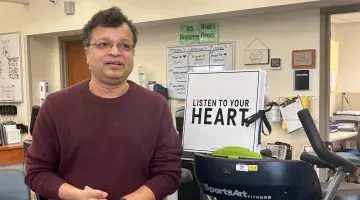Fallon Keating's Story: From Tragedy to Triumph
Author

South Shore Health
Spirited Fallon Keating didn’t realize a typical evening of outdoor fun would lead to a near-fatal head injury. Fallon rode her bicycle that warm summer night with friends when she accidentally collided with another child, falling from her bike and scraping her hand. Rachel Keating, Fallon’s mom, immediately brought her daughter inside to clean her scraped hand, not noticing any other unusual bumps, bruises or signs of injury.
“Fallon had her helmet on and seemed fine,” Rachel recalled. “Once we were inside the house, she complained that her head hurt, so I gave her some Children’s TYLENOL® and had her keep an icepack on her head while she rested on the couch,” she said. Close to an hour later, Fallon began to scream that her head hurt. “Fallon vomited and her eyes began to roll in the back of her head,” Rachel recalled. “I was terrified and knew I needed to act fast.”
Rachel urgently scooped up her little girl and made her way to South Shore Hospital’s Emergency Department. Unresponsive upon arrival, Fallon was brought back to the pediatric emergency team, where they inserted a tracheal tube — an emergency procedure performed on patients who are unconscious or who cannot breathe on their own. Intubating a patient helps to establish and maintain a patient’s airway. A Computed Tomography (CT) Scan was promptly performed and revealed a significant brain bleed.
Stephen Johnson, MD, director of neurosurgery, was immediately called in, and after reviewing the CT scan results knew surgery necessary to save this little girl’s life. “Despite the fact that Fallon had a helmet on during her fall, she still suffered a small skull fracture and a bleed in the brain, known as an epidural hematoma,” Johnson said. “When bleeding occurs in the brain, it can lead to increased intracranial pressure, which could have severe consequences.
In Fallon’s case, I knew she was in dire trouble and that surgery could not wait,” he explained. “We are always in a state of readiness,” said Robert Driscoll, MD, surgeon and medical director of South Shore Hospital’s trauma program. “Being a Level II Trauma Center means our trauma team is ready to immediately respond to critically injured patients, like Fallon, that enter the ED,” Driscoll said.
Prior to surgery, the emergency physicians knowing the critical condition Fallon was in and the likelihood that she would need additional critical care in Boston—summoned a Boston MedFlight helicopter.
“Though we have the ability to do an emergency craniotomy on someone Fallon’s age, we don’t have a Pediatric Intensive Care Unit to care for her post operatively, so the MedFlight team was in place to bring her to Boston Children’s Hospital,” said Fred Millham, MD, chief of surgery at South Shore Hospital.
As in many traumas to the brain, symptoms don’t typically present until life-threatening bleeding starts to take place. In Fallon’s situation, this energetic little girl, full of life and enjoying a summer evening mere hours before, was now in a critical state, heading to the operating room to undergo a craniotomy to expose the brain and stop the bleeding.
Paul Keating, Fallon Keating’s father, had tried hard that day to remain strong on the outside, especially in front of his son, Joe. “Watching Fallon get wheeled away for surgery, I couldn’t hold back my emotions any longer and had to step down a hallway by myself so I could just let it all out,” Paul recalled. During that moment, Paul fondly remembered the compassion of a caregiver who reached out to him. “A nurse came walking by and said ‘How’s Dad doing?’ and gave me a hug. The compassion and strength in that hug got me through to the next day,” Paul said.
The critical care transport specialists of Boston MedFlight arrived prior to Fallon’s surgery with adequate time to learn more about her condition, speak with the family and be ready to transport Fallon, post-surgery. “We watched from the window outside the operating room, so we knew Fallon’s condition throughout the surgery and could promptly report back to the parents. Our job at that point was just to wait until Dr. Johnson completed the craniotomy,” said Sarah Millar, flight nurse, Boston MedFlight.
Fallon’s surgery was successful and she was stable enough to be transported to Boston Children’s Hospital. “In Fallon’s case, the brain bleed was recognized and dealt with quickly which is absolutely what saved this child’s life. There’s no doubt in my mind,” said Bob Holst, medic with MedFlight. “We like working with a trauma center like South Shore Hospital because we know the patient is going to get the best care possible. Having that step up in care always helps us in flight because if something happens during transport, it’s often not an easy fix. Being treated at South Shore Hospital helped make our seven-minute flight with Fallon to Boston Children’s seamless,” said Holst.
Reuniting with the Caregivers Who Saved Her Life
Fallon and her family were so grateful to have a special reunion this past Fall with the very team that saved her life just one year prior. “Having the opportunity of seeing Dr. Johnson — my hero — the amazing MedFlight crew, Drs. Driscoll and Millham and knowing they took the time to reunite with us is something we’ll never forget,” Rachel commented. “The entire care team who took care of my baby girl really outdid themselves from the moment we walked through the doors of South Shore Hospital,” she said.
Dr. Johnson and the entire team were equally as excited to have the opportunity to see the once critical 5-year-old little girl—now a healthy, happy and energetic first grader. “It’s great to know that people appreciate what we do but it’s even greater to see patients doing so well. Fallon’s always so very grateful when she sees me and that can’t help but make you feel good about what you do,” Johnson beamed.
Fallon Keating’s case is one of 600 trauma team activations at South Shore Hospital annually. Without the expertise of such a skilled trauma team, Fallon’s tragedy may not have been a story of triumph. “We are forever grateful to the amazingly skilled team who took care of Fallon and we just can’t say thank you enough... you gave us our little red head back,” smiled Paul Keating.
Author

South Shore Health






